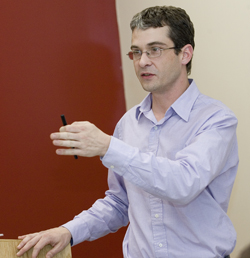O’Hara reveals message in the music to teach dissent
Provost’s Award for Innovative Teaching in General Education
| Students in John O’Hara’s "Dissent in American" class sit quietly as the lyrics to “Blue Tail Fly” (also known as “Jimmy Crack Corn”) fill the classroom. Their assignment is to interpret the lyrics of this well-known traditional song to find the hidden meaning within each verse. The students, most of whom know it as a nursery rhyme, struggle to understand a string of ambiguous lyrics, until O’Hara begins to explain that the song portrays the killing of a slave owner by his slave. Some of the students scribble notes, while others nod, beginning to see the full picture. “Blue Tail Fly” and similar songs represent some of the earliest forms of art created as vehicles for dissent in 19th-century America, O’Hara explains. “These songs often capture experiences that are not included in history books. They offer us a way to experience history in a way not offered by formal historical accounts,” said O’Hara, assistant professor of English. “People embedded their lives, history and misery into folk music. These songs give us an opportunity to look at history from a different perspective.” |
 Photo by Ryan S. Brandenberg/Temple University
O'Hara
|
|
|
|
|
The session proceeds with samples of anti-WWI songs, union hymns, and other types of political music of the early-20th century. For his innovative approach to developing and teaching the “Dissent in America” course, a U.S. Society unit of the General Education Program, O’Hara is being recognized with a Provost’s Award for Innovative Teaching in General Education. |